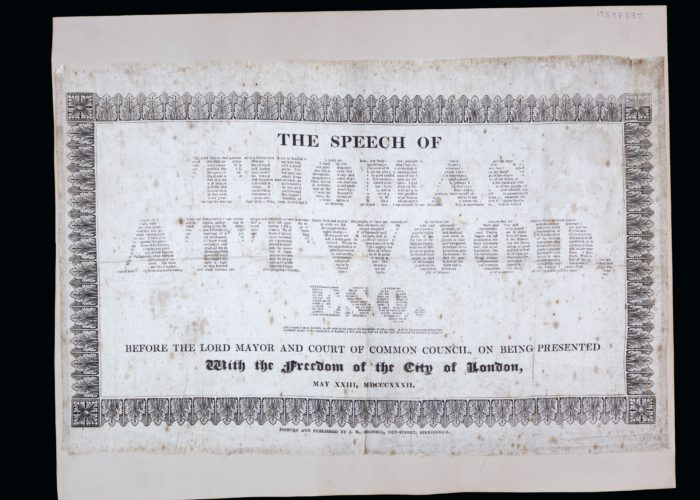Speech of Thomas Attwood, Printed on Silk
Theme: Social and cultural revolution, Challenging law and order: British riots and reforms
This piece of silk commemorates Thomas Attwood receiving the freedom of the City of London, following his role in the Great Reform Act of 1832. The Act granted more people in Britain the right to vote and created seats for MPs in new industrial towns like Birmingham and Manchester. The words of Attwood’s speech are contained within the letters of his name and title.
Thomas Attwood (1783-1856) was a banker, economist and political campaigner. Born the son of a wealthy Shropshire banker, he became involved in politics as a young man. At this time, voting in Britain was very unfair and undemocratic, with most people excluded from voting. MPs came from the richest families and represented mainly rural areas Voting was done publicly (unlike the secret ballots of today) which meant people faced discrimination if they voted against their landowner and bribery was rife. The wealthy held almost all the power and the middle and working classes, as well as all women, had little say.
In 1830, Thomas Attwood helped launch the Birmingham Political Union, to campaign for cities and large towns such as Birmingham (which had a population of over 145,000 at the time), to be directly represented in Parliament. The BPU became a model for other towns and cities, launching their own campaign organisations and joining the call for reform.
In 1831, reformers in Parliament tried to pass a bill to make the system fairer, but it was defeated. Riots followed in major towns and cities including Derby, Birmingham and Bristol, with people protesting, sometimes violently, against this decision. Public buildings were set on fire and as many as 70 people died. The government headed by the Duke of Wellington feared a full revolution if the electoral system was not reformed.
The Great Reform Act was finally passed in 1832. While more people were now entitled to vote, and seats were created for MPs in industrial towns, it actually had little impact on the working classes or women and, in reality, only increased the number of voters by about 18%.
By the time the Act was passed, Thomas Attwood had addressed over 200,000 people. In recognition of his efforts, the man whom supporters called ‘King Tom’ was given the freedom of the City of London. Attwood became one of Birmingham’s first two MPs, along with Joshua Scholefield, and went on to help establish and support the Chartist movement – which sought to extend the vote to all working class men.
Did you know..?
It would be 1918 before all men over the age of 21 and some women (aged over 30) were allowed to vote, and a further ten years before this was extended to all women over 21.
Use our Education activities to investigate this object and the theme of Reform further.
Highlights:
- Using objects, artworks and other sources to find out about the past
- Enquiry: Why did workers protest during the Age of Revolution
- How to make an interactive revolutionary banner
- Twitter campaigns
And much more…
Sources & acknowledgements
This object description and its related educational resources were researched and written by our team of historians and education specialists. For further information see the item’s home museum, gallery or archive, listed above.
- Related resources
- Enquiry Questions
-
Did you know..?
It would be 1918 before all men over the age of 21 and some women (aged over 30) were allowed to vote, and a further ten years before this was extended to all women over 21.
-
Education overview
You can access a range of teachers resources related to this object and more on our education page.
Please also see our glossary of terms for more detailed explanations of the terms used.
-
Curatorial info
- Originating Museum: Birmingham Museum and Art Gallery
- Production Date: 1832
- Creator: John Whitehouse Showell
- Material: Silk
- Original record
-
Use this image
You can download this image for personal and educational use but please take note of the license type and rights holder information.
- License Type:
Public domain
- License Type:



